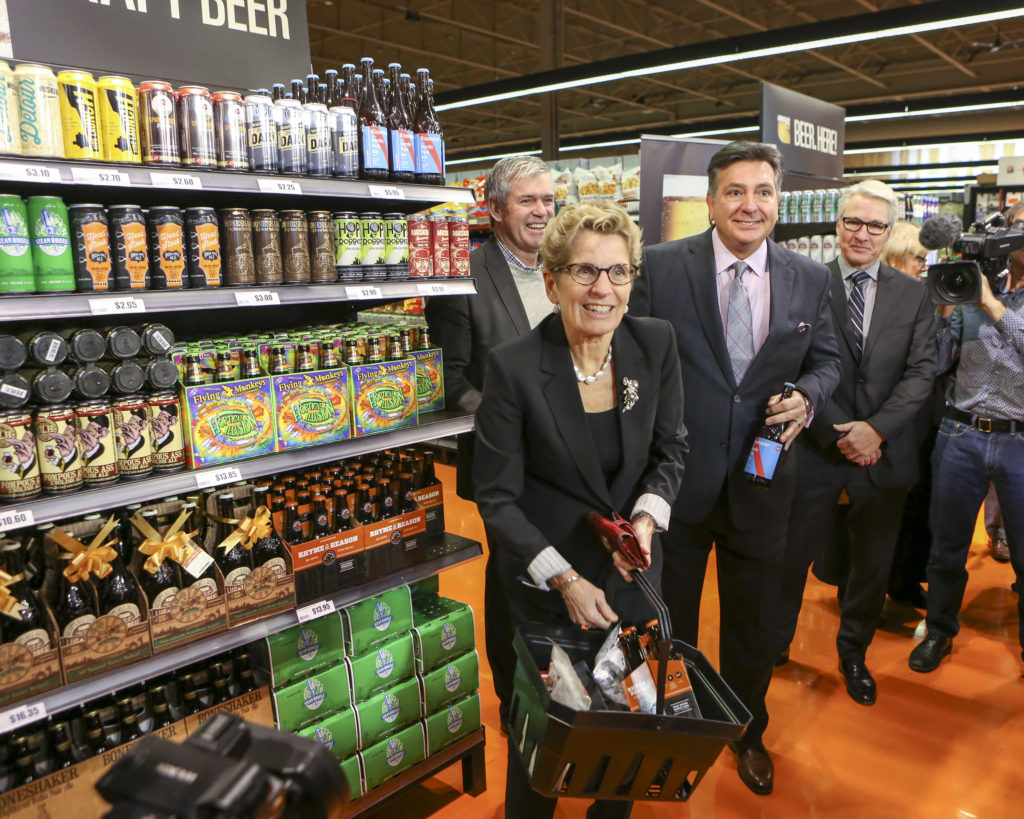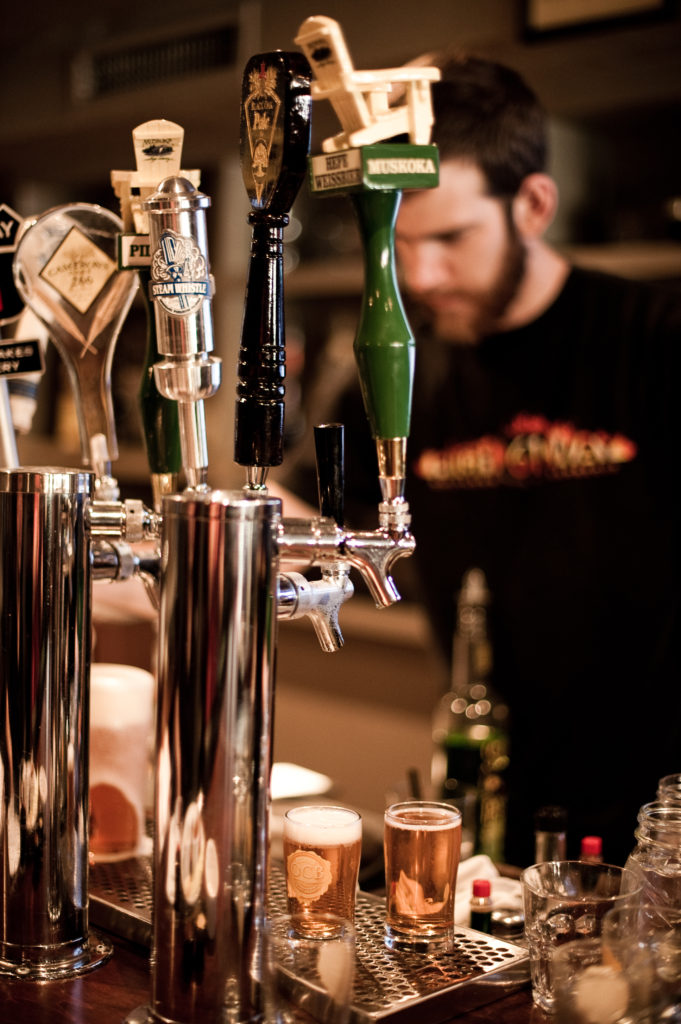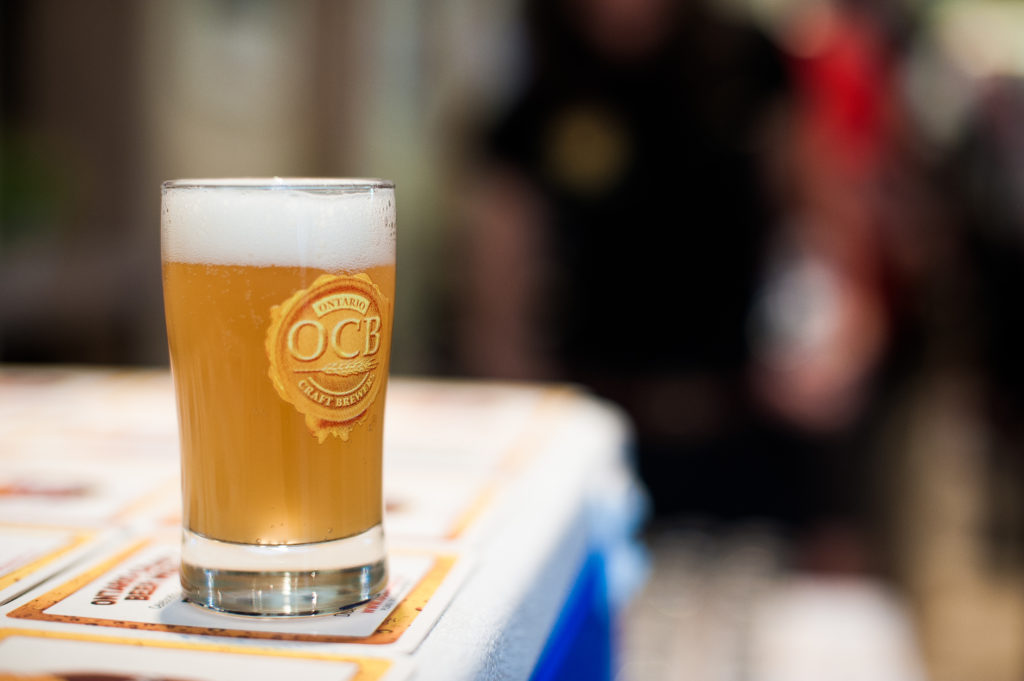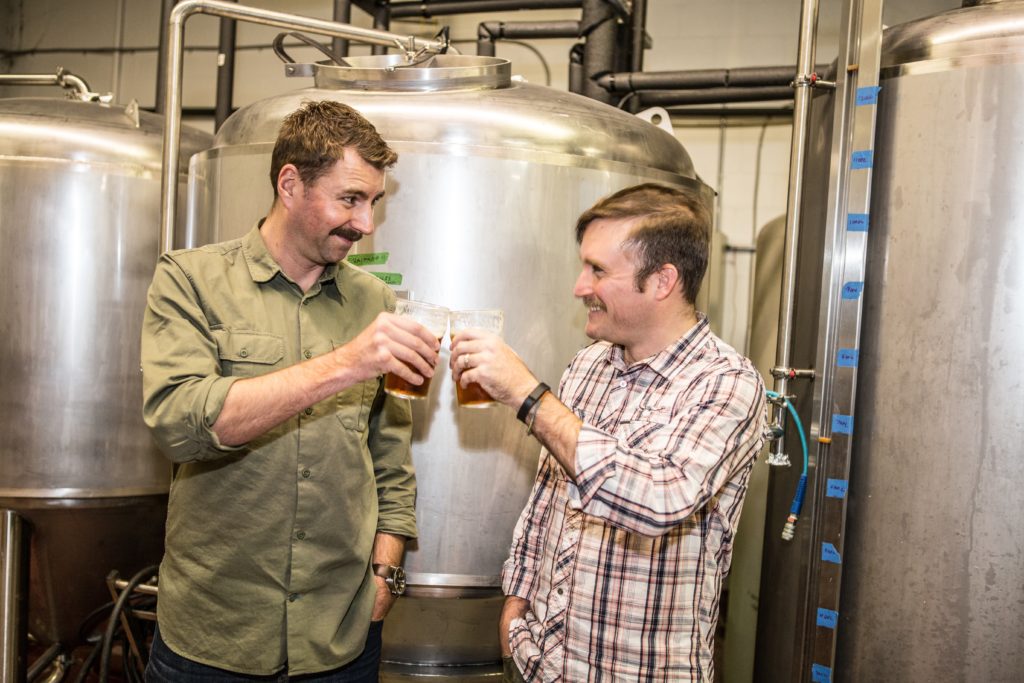
Ontario’s Premier Kathleen Wynne is currently a very popular individual in the eyes of breweries and beer buyers across the province. On the 15th December last year, she made history by simply buying a six-pack of beer at a grocery store. Commonplace for most, but for Ontarians, she was indulging in a simple pleasure that had been denied to consumers for too long.
“Today, the wait is over. Beer is here,” she announced at the Loblaws grocery store after procuring the Rhyme & Reason beers from Toronto’s Collective Arts Brewing. For Wynne, she was marking
a move away from purchasing beer controlled by the province’s strict Liquor Board of Ontario (LCBO) or the foreign-owned Beer Store.
Loblaws immediately rolled out beer sales across 19 outlets, with grocery stores planning a swift acceleration, ensuring that nearly 500 stores offer beer by the end of 2017.
“We salute Loblaw’s commitment to Ontario craft brewers and its exceptional efforts to provide us new retail opportunities,” says John Hay, President, Ontario Craft Brewers. “The province has a vibrant community of craft brewers and we expect Loblaw’s business to create new energy and new opportunities to connect Ontario customers with Ontario beer throughout the province.”
“Our customers shop with us for all the flavours and ingredients of great meals, and today we can better serve that demand with the announcement that beer is here,” said Grant Froese, CEO of Loblaw Companies.

He adds: “This is a historic first step for our company and for the Ontario government, giving customers the greater convenience of shopping for groceries and beer in one stop. We expect great demand and customer anticipation for more opportunity in our local stores throughout the province, consistent with the government’s planned roll-out.”
While changes to the grocery setup will have a major positive impact on independent brewers, a new governance model at the Beer Store (TBS) outlets across Ontario, which involved increase visibility for craft breweries, is also considered ground-breaking and, according to Ontario Craft Brewers, brings it much closer to its roots where all brewers in Ontario benefitted equally from the system.
“We look forward to working with the independent directors on an ongoing basis and in particular during in the transition phases that will take place over the next year or so. We welcome the creation of an Ontario Craft Beer category/section in all TBS stores at the shelf level and in any permanent and ongoing consumer-facing displays, they said in a statement.
Greg Taylor knows a great deal about beer in Ontario. As co-founder of Steam Whistle Brewing, a company he co-founded at the end of the nineties, he has helped developed the brewery’s sole offering, a Pilsner, to ensure it has become a mainstay for drinkers.

“What Wynne is doing for those involved in beer is huge. It will take away some of the monopolised situation that the larger breweries that Molson coors and AB Inbev has with what The Beer Store offers. They have carried craft beers it but their approach has not been conducive to promoting it. But now, there is a 20% merchandising opportunity to craft brewers, which will give them shelf space, and also for promotion, where three or four breweries can put their beers,” he explains.
Taylor adds that the same will apply for for groceries stores, dedicating around 20% space for craft beer. There are thousands of these, so the growth potential there is massive. “While the LCBO will still manage the sale of the beer, and the flow of the beer, the POs will go through the LCBO but we, or third party can bring them, and offer them to consumers.”
But while Taylor has optimism about these changes, they are not without solid grounding, either. And he knows it.
“Larger breweries didn’t want it to happen. They have been able to sell it wholesale, and for also for retail, which is very rare. Controlling what people are drinking. They are controlling it and now, they are not happy. They tried to influence the situation, with the union of LCBO staying that these changes will allow young kids to buy beer and that only their employees could properly control the sale of beer, implying that there is a lack of responsibility,” he explains.
Taylor says that there has been an “incredible resistance” from beer lobbyists, lobbying in government, from liberals in power and conservatives, as well as other parties. “This has been an incredible force and it’s been unfortunate, lobbying at federal level is controlled but at a provincial level it happens. The only reason that it’s taken 60 years is that these people know their stuff,” he states.
But Taylor, and his company, know that people love craft beer, and he has figures to back it up.
“In the LCBO, growth in craft beer was around 32% up, while in The Beer Store, owned by the big multinationals, this figure was only 1% which is a telling factor. That is very, very significant, as they sell 75% of the beer in the province. So these changes will be a big positive for us. But we still need to fight the fight together and take the market share. For us, it’s essential,” says Taylor.
“If you look at a small craft brewery, is that you want to be in your neighbourhood, you can now be at LCBO, Beer Stores, and the groceries. It’s important for breweries, for the economy, and for the country. Profits are going back into the country, the community, creating jobs in the process.”

For John Hay, president of Ontario Craft Brewers, the changes being made to the craft beer ecosystem across the province have been understandably welcomed.
Among these changes is the right to co-ship and to build joint distribution systems, which is considered essential to efficiently serving the new channels, and to make existing LCBO channel more efficient for the sector.
The organisation explains: “We have said over the years that some limited cross-selling would really help our smallest members and startups by creating secondary and tertiary markets that could very likely be needed as the larger systems run out of shelf space.
In light of all of the changes, the cross-selling option did not make it through at this time. Our recommendation is simply to review it in a year or two, once we can fully assess the impact of this first round of changes.”
For Hay, the changes go a long way in unlocking their ability to achieve our goal of having a craft brewery in every city and town in the province.
“This new environment, is only a good thing for craft beer. These measures are all helpful. We have at least 130 independent craft breweries, and this will hit around 200 before long. We want a brewery in every town and city, so we are well on our way to getting there,” he enthuses.
Craft beer has come a long way in Ontario during the last decade. In around 2003, according to Hay, the province had around 20 breweries, with even fewer “making much money”.
“But tax incentives allowed people to change their fortunes, expand, and with provincial government input for promotion, combined with the local food movement and a desire for change, helped it get going. It took from about 2003-2010 for it to really germinate. But during the last couple of years it has really exploded. The consumer was really ready for it,” he says.
Hay is firm in his drive, and belief, to double or triple job creation through the opening and expansion of more breweries in Ontario. “We are about 5% of the sales but about 35-40% of the jobs, so this can only improve.
“One of our main objectives is to have a brewery in each town or city. A few years ago it was in 40 communities, now 70. But we want that to change. Once you put a small brewery in there is a huge economic boost from that.
“Our challenge is to keep a broad enough footprint, keep enough new entrants coming in, keep it local, keep it approachable. And we always want to improve quality each and every day, staying close to the community and maintaining that closeness.”
One such new entrant to the brewery market is Mike Laba, the co-founder of established drinks importers and agents The Craft Brand Company. Alongside his co-founder, Chris Goddard, they have founded Brunswick Bierworks.

Pitched as a a partner brewing facility, located in the East York neighbourhood of Toronto, Ontario, the company is open concept brewery that will produce beers from local and global brewery partners.
“It provides our brewery partners an ability to access to National and International markets with fresh product brewed to their exact specifications under the supervision of their own Brewmaster. Our facility provides a variety of packaging options as well as the ability to distribute directly from our brewery. Our model allows brewers to expand their distribution without the capital costs of building a new brewery and without the incremental costs of import freight,” explains Laba.
Goddard adds: “Our open concept brewery consists of a 50 HL brewhouse for larger production and a 20 HL pilot system for recipe development, one-off brews and smaller batch seasonal beers. The brew house and all production equipment has been manufactured NSI, one of the finest manufacturers of beer equipment in the world.
The company has already enlisted Christian Riemerschmid von der Heide as its brewmaster. Having worked in the brewery and beverage industry for more then 30 years, he is a master brewer by profession having brewed brands like Augustiner in Munich and Guinness in Dublin.
With full construction mode set for Spring this year, the changes in beer distribution have ensured that it’s an exciting time for the team behind the new brewery.
“The LCBO has interest in beer and supporting Ontario crafts so any organisation producing products here is something they want to succeed, the LCBO has put things in place to give breweries a leg up, to improve network, distribution, says Laba, echoing Steam Whistle’s Taylor.
“But they are restricted of selling 6-packs or smaller, but that said, they don’t get discounts unlike the beer store. Which is a massive disadvantage, so while the LCBO has grown, they haven’t been able to do everything.”

He adds: “The biggest change we have has been with the approval of grocery stores having their licences granted, so that gives us another channel but that’s growing. The majority of beer sales profits flow out of our country, and that’s not right.”
Focusing on the Brunswick proposition, Laba and Goddard expect the business to prove popular with breweries wanting to expand their offering, and as a route into the Ontario market.
He explains: “From speaking with our partners, it was clear this was something that interested them. To take it another step, we told our partners about the opportunities to collaborate with the other brewers in our network as well. The idea of a number of craft brewing characters all under one roof? The excitement snowballed.
“This is when we knew that we could play within the restrictions of Ontario while offering innovation too. It is a all under one roof experience and it gets them a better access to market. For our European partners, it also allows us to brew their product for the US market if needed.
“As an partner of us? It’s an interesting process. For us personally, we will look at their branding, sit down and see if we are on the same page with everything. We require a strong relationship. We sit with the LCBO, and work out the best way to move forward with a brand. It’s about fitting and filling the gaps where the LCBO want to fill, so like seasonal beers.
“They would sample it after we fill in the forms, they give the feedback, pack size, then look at when in the calendar, then we look at compliance, with lab testing, design so the whole process takes 8 months to a year. As an import brewer you cannot sell in Ontario without an agent, so our job is to take brands to the LCBO and we do that work.”
Laba and Goddard plan to offer a proposition that is as strong a collaboration process as possible, and from speaking with partners, this has been the way people want it to go, says the company.
“Quality is paramount for everyone, the recipes are. This involved the yeast, yeast propagations the barley, the hops.
And for others, it’s about access to market, and doing things in a timely manner. brewing draught on market and getting to retail quickly is exciting, as well is the ability to minimise environmental impact, too. It’s less of a logistical challenge,” says Laba.
